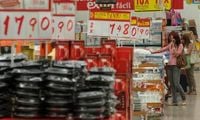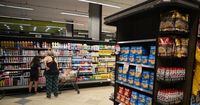The IPCA-15, Brazil's preliminary inflation index, rose by 0.43% in April 2025, following a 0.64% increase in March, as reported by the Brazilian Institute of Geography and Statistics (IBGE) on Friday, April 25, 2025. This rise has brought the accumulated inflation for the year to 2.43%, while the 12-month increase now stands at 5.49%, up from 5.26% in March. The results align closely with market expectations, which had anticipated a monthly increase of 0.43% and an annual advance of 5.49%, according to a Reuters survey.
Food and beverage prices were the primary drivers of this inflationary trend, increasing by 1.14% in April, up from 1.09% in March. This category contributed a significant 0.25 percentage points to the overall IPCA-15 index, reflecting the ongoing pressures consumers face at the grocery store. Within this group, food at home saw an increase of 1.29%, while food away from home rose by 0.77%, compared to 0.66% in March.
The most notable increases were seen in specific food items, particularly tomatoes, which surged by 32.67%, contributing 0.08 percentage points to the index. Ground coffee also saw a rise of 6.73%, while long-life milk increased by 2.44%. These price hikes highlight the ongoing challenges in the food supply chain, which have been exacerbated by various economic factors.
Health and personal care costs also saw a notable increase of 0.96% in April, compared to a mere 0.35% in March. This category's rise was influenced by increases in personal hygiene items (1.51%) and pharmaceutical products (1.04%), following the authorization of a price adjustment of up to 5.09% for medications starting March 31, 2025. Together, the food and health sectors accounted for a staggering 88% of the overall index for the month, underscoring their impact on consumer budgets.
Conversely, the transport sector was the only category to experience a decline, falling by 0.44% in April. This decrease was largely attributed to a 14.38% drop in airfare prices, which provided some relief to consumers. Additionally, fuel prices fell by 0.38%, with ethanol prices declining by 0.95%, vehicular gas by 0.71%, diesel by 0.64%, and gasoline by 0.29%. These reductions in transportation costs may help offset some of the inflationary pressures faced by households.
André Valério, a senior economist at Inter, noted that while the inflation of services decreased from 0.66% in March to just 0.18% in April, the core inflation remains elevated. He explained, "The result suggests a continuation of the trend observed in recent months. On one hand, there are no indications of worsening inflation, but the maintenance at a high level, especially of the core and services, suggests caution." Valério anticipates a potential increase of 0.50 percentage points in the Selic rate during the upcoming Central Bank meeting.
The Central Bank is scheduled to meet in early May 2025, where it will decide on the basic interest rate, currently set at 14.25% per year. This meeting follows a previous increase of 1 percentage point, indicating that any future adjustments may be more measured.
Beyond domestic factors, external uncertainties are also influencing the economic landscape, particularly due to tariff measures implemented by U.S. President Donald Trump, which have disrupted global trade. Paulo Picchetti, the director of International Affairs and Corporate Risk Management at the Central Bank, stated that the institution remains cautious regarding its decisions on the Selic rate in light of these uncertainties.
The latest Focus survey conducted by the Central Bank reveals that experts expect inflation to reach 5.57% by the end of the year, with the Selic rate projected to rise to 15.00%. This outlook reflects ongoing concerns about inflationary pressures and the potential need for further monetary tightening.
In summary, the IPCA-15 data for April 2025 reflects a complex economic environment where rising food and health costs continue to challenge consumers, while transport costs provide a slight reprieve. The Central Bank's upcoming decisions will be crucial in navigating these inflationary pressures amidst global uncertainties. As Brazil approaches the second half of the year, the interplay between domestic policy and international economic conditions will be closely watched by analysts and consumers alike.



